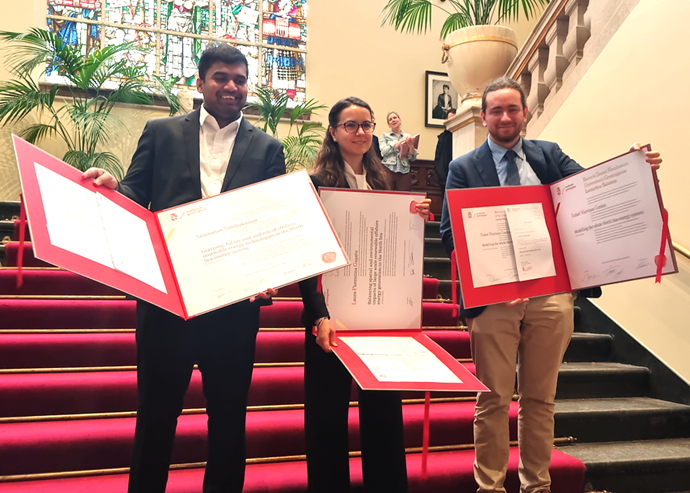Three PhD defenses in one day on ‘Europe's largest living lab’

The energy transition in the North Sea: not one, but three UG researchers received their PhD on this topic last Tuesday. After their PhD ceremony, the three brand-new doctors joined three professors to further discuss the future of the North Sea at the House of Connections.
Rafael Martínez Gordón, Laura Guşatu and Srinivasan Santhakumar received their PhD on Tuesday on their research that took place within the ENergy SYStems in TRAnsition project, or ENSYSTRA in short. The project was funded from the Marie Curie grants as part of Horizon 2020, the European programme for research and innovation. The ENSYSTRA project focused on the transition to sustainable energy systems in the North Sea.
‘One big innovation system’
'The North Sea is the largest living lab in Europe,' says André Faaij, Professor of Energy System Analysis at the University of Groningen, supervisor of the three PhD students and Project Leader of ENSYSTRA. 'In this region, we want to eventually phase out oil and gas altogether and replace it with sustainable alternatives, including offshore wind energy. Many other technologies such as floating solar parks, storage techniques and hydrogen will also play a role. At the same time, we want to continue re-use part of the existing oil and gas infrastructure. This development makes the North Sea region one big innovation system.'
Within ENSYSTRA, which was coordinated by the University of Groningen and New Energy Coalition, 15 PhD students worked together at various knowledge institutions and industry partners from Denmark, Germany, the Netherlands, Sweden, Norway and the United Kingdom to develop new technologies and strategies for the energy transition. The common denominator of the involved parties is their competence in the field of the energy transition and their shared location around the North Sea.
The PhD students worked at universities and research institutes as well as industry partners. 'This exchange created a fantastic combined working environment. Many of the PhD students were able to continue working at the companies and institutions after their PhD research,' Faaij tells. In addition, interdisciplinarity was highly valued within ENSYSTRA, as the energy transition requires changes in technology, behaviour and governance. 'It is not only about engineering; social sciences and economics are crucial as well.'
Scenarios and stakeholders
Rafael Martínez Gordón was one of three Groningen PhD researchers within the ENSYTRA project. During his PhD, he studied energy systems in the North Sea, meaning all processes and infrastructures involved in the production, distribution and consumption of (renewable) energy. For his thesis, he developed an energy model, which helps to better understand and optimize renewable energy systems. Moreover, the model helps draw up different scenarios for policymakers. 'Within the ENSYSTRA project, we not only conducted research, but also wrote policy notes for European decision makers,' Gordón says.
When developing various scenarios, spatial planning in the North Sea is of major importance. Laura Guşatu, one of the three researchers who received a PhD last Tuesday, focused on this topic. She researched the spatial and environmental impacts of large-scale renewable offshore energy generation. In the North Sea, various stakeholders 'claim' the limited space available, Guşatu says. Therefore, offshore projects have to compete or collaborate with other activities, such as shipping, oil and gas extraction and the environment. In her research, the PhD student mapped these different stakeholder interests.
Floating wind turbines
The spatial potential is strongly related to the development of renewable energy costs in the North Sea, Srinivasan Santhakumar's area of research. He researched the pace at which the cost of offshore renewable energy technologies is declining. A key example is floating wind turbines, which, unlike wind turbines with a fixed foundation, can be placed in deep waters. The costs are still high today, but in the future, Santhakumar says these turbines could become a major contributor to renewable energy production in the North Sea.
The so-called 'offshore grid', the electrical network connecting offshore wind farms to the mainland, also plays an important role. Offshore projects are moving ever further away from the coast. To reduce costs and balance energy prices, Santhakumar says it is crucial for countries around the North Sea to cooperate and integrate these 'offshore grids'.
Together, the three researchers shed light on the challenges and opportunities the North Sea offers for the future of renewable energy. According to Faaij, the project was a great success. 'The results from the studies are superbly relevant. The insights will become very important in the coming decades,' the professor concludes.
During the meeting at the House of Connections, three renowned professors (Chris Zuidema – University of Groningen, Olav Hohmeyer - University of Flensburg, Mohsen Assadi - University of Stavanger) shared their views on the future of the energy transition in the North Sea. Afterwards, the three brand-new PhDs, led by André Faaij, presented their research and their vision for the region and the field.
More news
-
15 September 2025
Successful visit to the UG by Rector of Institut Teknologi Bandung

